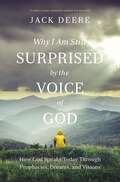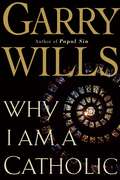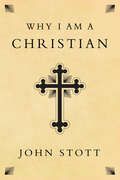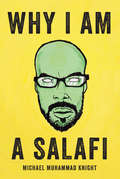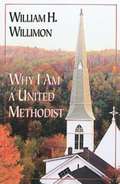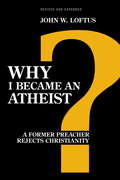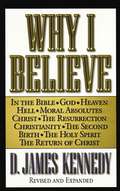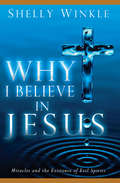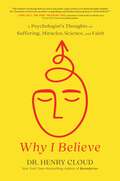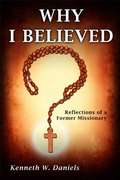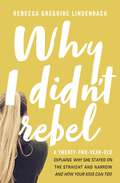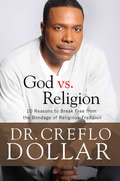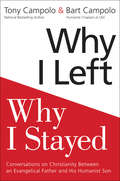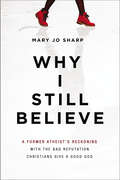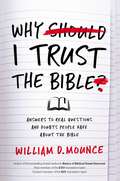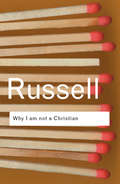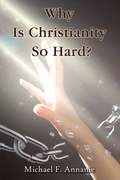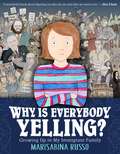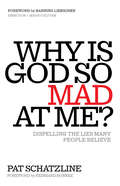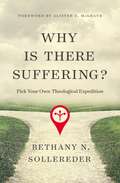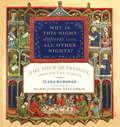- Table View
- List View
Why I Am Still Surprised by the Voice of God: How God Speaks Today Through Prophecies, Dreams, and Visions
by Jack S. DeereJesus knew the Bible better than anyone, yet he claimed that he had to hear his Father's voice in order to fulfill God's purposes for his life. His enemies, the religious elite, had supreme confidence in their knowledge of Scripture, yet Jesus said that none of them had ever heard the voice of the Father.When Jack Deere turned seventeen, he did not know God or a single verse of Scripture. Then, one night a friend quoted John 10:28 to him, and he believed in Jesus. At twenty-seven, he became a professor of Old Testament Exegesis and Semitic Languages at Dallas Theological Seminary where he taught his students to avoid the trap of believing that God still spoke outside the pages of the Bible. He believed it was all real--just as the authors of the Old and New Testaments had said it happened--but it no longer happened today. People who believed God had spoken to them personally were emotionally unstable or too lazy to read the Bible.After a trusted friend shared he believed God still spoke today, Jack began a thorough study of every instance of God speaking supernaturally to someone in the New Testament. He saw how they didn't just hear the voice of God; they were dependent on the voice of God to fulfill the highest purpose for their lives. Jack became convinced that we should expect God to speak outside the Scriptures, but he didn't have a clue how to hear his voice.This is the story of how Jack Deere learned to hear the voice of God and, in doing so, became a friend of Jesus.Now a modern classic, Jack wrote Surprised by the Voice of God over twenty-five years ago. Based on that first book, Why I Am Still Surprised by the Voice of God has been entirely rewritten and includes additional thoughts and insights from a lifetime of hearing God speak. Deere guides you through the Bible to discover the variety of creative, deeply personal ways God still communicates with us today. You'll learn how God speaks with people apart from the Bible, though never in contradiction to it. Deere first describes the ways God revealed his thoughts to the men and women of the Bible, and then shares why God continues to speak to us today using the same methods. He provides counsel and guidance for knowing how to accurately hear God speak through prophecies, dreams, visions, and other forms of divine communication. With candor, sensitivity, and a profound understanding of Scripture, Deere identifies our hindrances to hearing the voice of God and calls us to a more intimate relationship with God. Filled with fascinating stories and personal accounts, Why I Am Still Surprised by the Voice of God is for all who want to walk in friendship with God.
Why I Am a Catholic
by Garry WillsIn this provocative work, which could not be timelier, Garry Wills, one of our country's most noted writers and historians, offers a powerful statement of his Catholic faith. Beginning with a reflection on his early experience of that faith as a child and later as a Jesuit seminarian, Wills reveals the importance of Catholicism in his own life. He goes on to challenge, in clear and forceful terms, the claim that criticism or reform of the papacy is an assault on the faith itself. For Wills, a Catholic can be both loyal and critical, a loving child who stays with his father even if the parent is wrong. Wills turns outward from his personal experiences to present a sweeping narrative covering two thousand years of church history, revealing that the papacy, far from being an unchanging institution, has been transformed dramatically over the millennia -- and can be reimagined in the future. At a time when the church faces one of its most difficult crises, Garry Wills offers an important and compelling entrée into the discussion of the church's past -- and its future. Intellectually brisk and spiritually moving, Why I Am a Catholic poses urgent questions for Catholic and non-Catholic readers alike.
Why I Am a Salafi
by Michael Muhammad KnightThe Salafi are a revivalist Sunni Muslim movement misunderstood by most Americans, and even many Muslims. The New York Times' first reference to Salafis as a distinct group appears in 1979 after a band of armed men seized control of the Great Mosque in Mecca. After 1979, there is not another mention of Salafis in the Times until 2000, in an article on links between Yemeni radicals and Osama Bin Ladin. In 2013, an article appeared in USA Today labeling Salafis as Sunni Islam's "most radical sect" and declaring them "the most anti-Western" of any Islamist group. Today, Salafism is widely implicated in the rise of ISIS.Knight-an acclaimed writer who has explored his own evolving religious beliefs in a range of novels, memoirs and essays-uses this mislabeling as yet another opportunity to engage those corners of Islamic tradition that others might dismiss as absurd or dangerous.Why I am Salafi examines problems of interpretation, practice, and community, illustrating why terms like orthodox or progressive, Sufi or Salafi often fail to convey the reality of Muslim experience. Knight's analysis includes examination of his own complex religious journey, having converted to Islam at sixteen, studying at a madrassa in Pakistan at seventeen, to
Why I Am a United Methodist
by William H. WillimonIn seven chapters, Willimon examines United Methodism and the ways it has made and continues to make a difference in his life. In an inspiring and enlightening way, he writes of his pride in being part of a church that has grown from one man's experience to a worldwide movement covering the globe with its message. A learning guide for groups and individuals is included. Chapter titles: Because Religion Is of the Heart Because the Bible Is Our Book Because Religion Is Practical Because Christians Are to Witness Because Christians Are to Grow Because Religion Is Not a Private Affair
Why I Am an Agnostic and Other Essays: Including Expressions of Faith from a Protestant, a Catholic and a Jew
by Clarence S. DarrowThe renowned lawyer Clarence Darrow (1857-1938) was also an impassioned defender of intellectual freedom, individual liberties, and social justice. In these wide-ranging essays, Darrow attacks beliefs in the inerrancy of the Bible, the immortality of the soul, miracles, and heaven as being completely at odds with human experience and science. The life best lived, Darrow contends, is one that is ruled by reason, uncluttered by dogmatism, and aided by compassion for our fellow human beings.
Why I Became an Atheist
by John W. LoftusFor about two decades John W. Loftus was a devout evangelical Christian, an ordained minister of the Church of Christ, and an ardent apologist for Christianity. With three degrees-in philosophy, theology, and philosophy of religion-he was adept at using rational argumentation to defend the faith. But over the years, doubts about the credibility of key Christian tenets began to creep into his thinking. By the late 1990s he experienced a full-blown crisis of faith. In this honest appraisal of his journey from believer to atheist, the author carefully explains the experiences and the reasoning process that led him to reject religious belief. The original edition of this book was published in 2006 and reissued in 2008. Since that time, Loftus has received a good deal of critical feedback from Christians and skeptics alike. In this revised and expanded edition, the author addresses criticisms of the original, adds new argumentation and references, and refines his presentation. For every issue he succinctly summarizes the various points of view and provides references for further reading. In conclusion, he describes the implications of life without belief in God, some liberating, some sobering. This frank critique of Christian belief from a former insider will interest freethinkers as well as anyone with doubts about the claims of religion.
Why I Became an Atheist
by John W. LoftusFor about two decades John W. Loftus was a devout evangelical Christian, an ordained minister of the Church of Christ, and an ardent apologist for Christianity. With three degrees-in philosophy, theology, and philosophy of religion-he was adept at using rational argumentation to defend the faith. But over the years, doubts about the credibility of key Christian tenets began to creep into his thinking. By the late 1990s he experienced a full-blown crisis of faith. In this honest appraisal of his journey from believer to atheist, the author carefully explains the experiences and the reasoning process that led him to reject religious belief. The original edition of this book was published in 2006 and reissued in 2008. Since that time, Loftus has received a good deal of critical feedback from Christians and skeptics alike. In this revised and expanded edition, the author addresses criticisms of the original, adds new argumentation and references, and refines his presentation. For every issue he succinctly summarizes the various points of view and provides references for further reading. In conclusion, he describes the implications of life without belief in God, some liberating, some sobering. This frank critique of Christian belief from a former insider will interest freethinkers as well as anyone with doubts about the claims of religion.
Why I Became an Atheist
by John W. LoftusFor about two decades John W. Loftus was a devout evangelical Christian, an ordained minister of the Church of Christ, and an ardent apologist for Christianity. With three degrees-in philosophy, theology, and philosophy of religion-he was adept at using rational argumentation to defend the faith. But over the years, doubts about the credibility of key Christian tenets began to creep into his thinking. By the late 1990s he experienced a full-blown crisis of faith. In this honest appraisal of his journey from believer to atheist, the author carefully explains the experiences and the reasoning process that led him to reject religious belief. The original edition of this book was published in 2006 and reissued in 2008. Since that time, Loftus has received a good deal of critical feedback from Christians and skeptics alike. In this revised and expanded edition, the author addresses criticisms of the original, adds new argumentation and references, and refines his presentation. For every issue he succinctly summarizes the various points of view and provides references for further reading. In conclusion, he describes the implications of life without belief in God, some liberating, some sobering. This frank critique of Christian belief from a former insider will interest freethinkers as well as anyone with doubts about the claims of religion.
Why I Became an Atheist
by John W. LoftusFor about two decades John W. Loftus was a devout evangelical Christian, an ordained minister of the Church of Christ, and an ardent apologist for Christianity. With three degrees--in philosophy, theology, and philosophy of religion--he was adept at using rational argumentation to defend the faith. But over the years, doubts about the credibility of key Christian tenets began to creep into his thinking. By the late 1990s he experienced a full-blown crisis of faith. In this honest appraisal of his journey from believer to atheist, the author carefully explains the experiences and the reasoning process that led him to reject religious belief. The original edition of this book was published in 2006 and reissued in 2008. Since that time, Loftus has received a good deal of critical feedback from Christians and skeptics alike. In this revised and expanded edition, the author addresses criticisms of the original, adds new argumentation and references, and refines his presentation. For every issue he succinctly summarizes the various points of view and provides references for further reading. In conclusion, he describes the implications of life without belief in God, some liberating, some sobering. This frank critique of Christian belief from a former insider will interest freethinkers as well as anyone with doubts about the claims of religion.From the Trade Paperback edition.
Why I Believe
by James KennedyIn this powerful declaration of what Christians believe and why, Kennedy explores the foundations of the Christian faith. For new believers and seasoned Christians alike, this book will strengthen their faith by answering that all consuming question, "Why?"
Why I Believe in Jesus
by Shelly WinkleMiracles, Signs and WondersIt is no wonder that Shelly Winkle believes in Jesus. Her life is a testimony to the fact that God exists and still performs miracles today. The devil attempted to destroy her life time after time, but God heard her cries for help and intervened in every situation. Evil spirits are real, and you may be unintentionally inviting them into your life. In Why I Believe in Jesus, Shelly emphasizes the importance of studying the Word of God, knowing your enemy, and understanding your God-given right as a believer to call upon the name of Jesus. Shelly Winkle&’s incredible testimony of miraculous healing and restoration will increase your faith and inspire you to find evidence of God in your own life, so you too can say, &“Look what the Lord has done!&”
Why I Believe: A Psychologist's Thoughts on Suffering, Miracles, Science, and Faith
by Dr. Henry CloudA leadership expert, clinical psychologist, and New York Times bestselling author asks the big questions and shares his early mental health struggles in this groundbreaking, uplifting book. World-renowned psychologist and leadership expert Henry Cloud has impacted millions of lives through his groundbreaking books and through his work coaching leaders of the most influential organizations in the world. But few people know the details of his own story and how he became one of the most beloved and respected psychologists and faith influencers in America. In this indelibly personal and vulnerable book, Dr. Cloud leads us through his early struggles with illness and depression and the miracles that healed him and led him to his calling as a healer of others. Through masterful storytelling combined with a deeply nuanced understanding of the human mind, Dr. Cloud invites readers to inhabit the spaces of suffering and elation that make us most human and to walk alongside of him as he ponders the great questions we are so often afraid to ask but which also give life meaning. Written in the vein of such groundbreaking books as An Unquiet Mind, When Breath Becomes Air, and On Being Mortal, Why I Believe is a masterwork in spiritual exploration from one of the great scientific minds and faith voices of our time.
Why I Believed: Reflections of a Former Missionary
by Kenneth W. DanielsThis is a story of a true Christian who believed for nearly three decades, having grown up the son of evangelical missionary parents, later becoming a missionary himself. Yet he slowly lost his faith and now no longer holds it. In this part-autobiography, part-exposé, Ken traces his journey from evangelical missionary to secular humanist while remaining part of a committed Christian family. He looks back at a number of reasons he remained a believer for over a decade after his initial doubts began at university, critically evaluating each one in a separate chapter. Whether or not you agree with Ken's conclusions, you will find his journey and his reasons for taking it fascinating and informative. You will end up better understanding, if not appreciating, the mind of apostates whose desire is to follow the evidence wherever it leads.
Why I Didn't Rebel: A Twenty-Two-Year-Old Explains Why She Stayed on the Straight and Narrow---and How Your Kids Can Too
by Rebecca Gregoire LindenbachIn this unique combination of personal history, interviews, and social science, a young millennial shares surprising reasons that youthful rebellion isn’t inevitable and points the way for raising healthy, grounded children who love God.Teen rebellion is seen as a cultural norm, but Rebecca Gregoire Lindenbach begs to differ. In Why I Didn’t Rebel--based on a viral blog post that has been read by more than 750,000 people--Lindenbach shows how rebellion is neither unavoidable nor completely understood. Based on interviews with her peers and combining the latest research in psychology and social science with stories from her own life, she gives parents a new paradigm for raising kids who don’t go off the rails.Rather than provide step-by-step instructions on how to construct the perfect family, Lindenbach tells her own story and the stories of others as examples of what went right, inviting readers to think differently about parenting. Addressing hot-button issues such as courtship, the purity movement, and spanking--and revealing how some widely-held beliefs in the Christian community may not actually help children--Why I Didn’t Rebel provides an utterly unique, eye-opening vision for raising kids who follow God rather than the world.
Why I Hate Religion: 10 Reasons to Break Free from the Bondage of Religious Tradition
by Creflo DollarPastor Creflo Dollar offers ten compelling reasons why God hates religion--but loves for people to have real relationships with Christ. Religion has broken churches, fueled wars, and driven people away from the true Gospel of Jesus. WHY I HATE RELIGION is a clarion call for people to ditch religion and embrace relationship as it explores the top ten reasons why God hates religion, such as:Religion makes people try to earn their way into heaven--but Christ offers grace. Religion says God uses calamity to teach his people--but Christ comforts us.Religion blames problems on God--but Christ helps people learn from their mistakes. Religion makes prayer a powerless "form of godliness"--but Christ hears every word. WHY I HATE RELIGION offers an empowering understanding of true Christianity, one that transforms church into full, authentic, meaningful relationship with Jesus.
Why I Left, Why I Stayed: Conversations on Christianity Between an Evangelical Father and His Humanist Son
by Tony Campolo Bart CampoloBestselling Christian author, activist, and scholar Tony Campolo and his son Bart, an avowed Humanist, debate their spiritual differences and explore similarities involving faith, belief, and hope that they share.Over a Thanksgiving dinner, fifty-year-old Bart Campolo announced to his Evangelical pastor father, Tony Campolo, that after a lifetime immersed in the Christian faith, he no longer believed in God. The revelation shook the Campolo family dynamic and forced father and son to each reconsider his own personal journey of faith—dual spiritual investigations into theology, faith, and Humanism that eventually led Bart and Tony back to one another. In Why I Left, Why I Stayed, the Campolos reflect on their individual spiritual odysseys and how they evolved when their paths diverged. Tony, a renowned Christian teacher and pastor, recounts his experience, from the initial heartbreak of discovering Bart’s change in faith, to the subsequent healing he found in his own self-examination, to his embracing of his son’s point of view. Bart, an author and Humanist chaplain at the University of Southern California, considers his faith journey from Progressive Christianity to Humanism, revealing how it affected his outlook and transformed his relationship with his father. As Why I Left, Why I Stayed makes clear, a painful schism between father and son that could have divided them irreparably became instead an opening that offered each an invaluable look not only at what separated them, but more importantly, what they shared.
Why I Still Believe: A Former Atheist's Reckoning with the Bad Reputation Christians Give a Good God
by Mary Jo SharpFor anyone who feels caught in the tension between the beauty of God's story and the ugliness of human hypocrisy, Why I Still Believe offers a stirring story of hope.Why would anyone be a Christian when there is so much hypocrisy in the church? Mary Jo Sharp shares her journey as a skeptical believer who still holds to a beautiful faith despite wounding experiences in the Christian community.At a time when de-conversion stories have become all too common, this is an earnest response - the compelling conversion of an unlikely believer whose questions ultimately led her to irresistible hope. Sharp addresses her own struggle with the reality that God's people repeatedly give God's story a bad name and takes a careful look at how the current church often inadvertently produces atheists despite its life-giving message.For those who feel the ever-present tension between the beauty of salvation and the dark side of human nature, Why I Still Believe is a candid and approachable case for believing in God when you really want to walk away. With fresh and thoughtful insights, this spiritual narrative presents relevant answers to haunting questions like:Isn't there too much pain and suffering to believe?Is it okay to have doubt?What if Jesus' story is a copy of another story?Is there any evidence for Jesus' resurrection?Does atheism explain the human experience better than Christianity can? How can the truth of Christianity matter when the behaviors of Christians are reprehensible?At once logical and loving, Sharp reframes the gospel as it truly is: the good news of redemption. With firmly grounded truths, Why I Still Believe is an affirming reminder that the hypocrisy of Christians can never negate the transforming grace and truth of Christ.
Why I Trust the Bible: Answers to Real Questions and Doubts People Have about the Bible
by William D. MounceA Clear Guide to Help Readers Understand Why They Can Trust the BibleWe are often told we can no longer assume that the Bible is trustworthy. From social media memes to popular scholarship, so many attacks have been launched on the believability of Scripture that many have serious questions about the Bible, such as:Did Jesus actually live?Did the biblical writers invent their message?How can we trust the gospels since they were written so long after Jesus lived?How can we believe a Bible that is full of internal contradictions with itself and external contradictions with science?Aren't the biblical manuscripts we have just copies of copies that are so corrupted they don't represent what the original authors wrote?Why should we believe the books that are in the Bible, since many good ones were left out, like the Gospel of Thomas?Why trust the Bible when there are so many contradictory translations of it?If you find yourself unable to answer questions such as these, but wanting to, Why I Trust the Bible by eminent Bible scholar and translator William Mounce is for you. These questions and more are discussed and answered in a reasoned, definitive, and winsome way.The truth is that the Bible is better attested and more defensible today than it ever has been. Questions about the Bible are perhaps the most significant challenge confronting Christian faith today, but they can be answered well and in a way which will lead to a deeper appreciation for the truth and ongoing relevance of the Bible.
Why I am not a Christian: and Other Essays on Religion and Related Subjects (Routledge Classics)
by Bertrand RussellWhile its tone is playful and frivolous, this book poses tough questions over the nature of religion and belief. Religion provides comfortable responses to the questions that have always beset humankind - why are we here, what is the point of being alive, how ought we to behave? Russell snatches that comfort away, leaving us instead with other, more troublesome alternatives: responsibility, autonomy, self-awareness. He tells us that the time to live is now, the place to live is here, and the way to be happy is to ensure others are happy.
Why Is Christianity So Hard?
by Michael F. AnnanieChristianity is hard. Having faith today is difficult at best. Our faith will be tested by God, Satan, society, our loved ones and ourselves. Why is the gate narrow? Why do we need to share in the sufferings of Christ? Why is evil in the world? Why did you give us free will to choose? Why is the message of the Gospel foolishness to most people? Doesn’t God want all to come to a saving knowledge of Jesus Christ. Why is it so hard for us to believe you? Frustrated with the struggles to maintain his faith, the author works through some of the hard questions that Christians will be asked and may have asked themselves. God works through the least likely to accomplish His purpose and will. Written by a soldier for Christ, this book organizes biblical truths to enable the reader to formulate their own beliefs based on the word of God. After years of seeking God through studying, attending and leading classes, the author presents what the Bible says about key issues in the believers walk of faith. “For whatever is born of God overcomes the world. And this is the victory that has overcome the world--our faith” (1 John 5:4 NKJV).
Why Is Everybody Yelling?: Growing Up in My Immigrant Family
by Marisabina Russo“A wonderful book about figuring out who we are and who we want to be when we grow up. It’s also about being an American—especially a first-generation American.” —Roz Chast This graphic-novel debut from an acclaimed picture book creator is a powerfully moving memoir of the author's experiences with family, religion, and coming of age in the aftermath of World War II, and the childhood struggles and family secrets that shaped her.It’s 1950s New York, and Marisabina Russo is being raised Catholic and attending a Catholic school that she loves—but when she finds out that she’s Jewish by blood, and that her family members are Jewish survivors of the Holocaust, her childhood is thrown into turmoil. To make matters more complicated, her father is out of the picture, her mother is ambitious and demanding, and her older half-brothers have troubles, too. Following the author’s young life into the tumultuous, liberating 1960s, this heartfelt, unexpectedly humorous, and meticulously illustrated graphic-novel memoir explores the childhood burdens of memory and guilt, and Marisabina’s struggle and success in forming an identity entirely her own.
Why Is God So Mad at Me?: Dispelling the Lies Many People Believe
by Pat SchatzlineGod Is Not Mad at You God loves you. You may have heard it a thousand times, and it is a common theme in Christianity. But do you believe it? Many of the messages we hear every day (from both society and the church) tell you the exact opposite. As a result, millions of people from all backgrounds have bought into the idea that God is not only angry but also that He’s angry with them. This belief is damaging countless lives. In Why Is God So Mad at Me? Pat Schatzline sets the record straight, introducing you to a God who accepts us, transforms us, renews us, and gives us a future filled with abundant blessing and opportunity.
Why Is There Suffering?: Pick Your Own Theological Expedition
by Bethany N. SollerederTake a Unique Adventure as You Explore Questions about God, Suffering, Evil, Pain, and Final DestinyBe engaged, enlightened, and surprised by this unique book on suffering that gives control to the reader. Similar to novels that allow readers to choose their own "paths," Why Is There Suffering? by Bethany Sollereder invites readers to make choices that lead them on an exploration of theological possibilities about topics like:God's existenceGod's natureThe nature of sufferingEvilPainThe final destiny of humans and animalsReaders will face multiple possibilities regarding suffering and its theological explanations and have to make choices about which one they find most plausible. Each decision will lead to further complexities and new choices, helping readers see how theological choices lead to certain conclusions. This book does not offer final answers. Instead, it introduces the "theological" possibilities, both Christian and non-Christian, that readers can explore and wrestle with so they can make informed decisions about their beliefs.Taking an intentionally light-hearted approach to a heavy topic this accessible and winsome book presents an unusually helpful introduction to the problem of suffering and the most commonly offered responses to it. Suggestions for further reading are provided with each choice.
Why Is This Night Different from All Other Nights?
by Ilana KurshanThis fascinating, informative, and beautifully illustrated books translates the Passover seder's Four Questions into twenty-three languages and provides capsule histories of the Jews in the countries where the languages are spoken. The recitation of the Four Questions at the beginning of the Passover seder by the youngest participant is one of the highlights of the evening and captures its very essence: to keep the memory of the Exodus of the Jews from Egyptian slavery alive in our minds, and to teach our children about their heritage and history. This unique volume covers a variety of languages of the Jewish Diaspora—from French to Farsi, from Latin to Ladino, from Amharic to Afrikaans, from Yiddish to Swedish to Chinese. For each language a translation (and, where necessary, a transliteration) of the Four Questions is provided, accompanied by a brief overview of Jewish life and culture among the speakers of the language, and an illustrations of either historical or contemporary interest. The perfect seder gift,Why Is This Night Different from All Other Nights?is also an excellent introduction to Jewish history in the Diaspora for young and old alike. From the Hardcover edition.
